Data of TD “The Gold Rush in Amazon” are approached in an article of Mongabay that follows the day-by-day of the panning in the region.

“A point all specialists agree upon is that any romantic image that once existed about the panning shall be broken. The rudimentary work of the man and his panning tray sparkling nuggets on the river bed does not exist anymore.”
In a series of articles, which closely follow up the day-by-day in panning in Amazon, Mongabay shows in loco the data recently published by Escolhas in the Text for Discussion “The new gold rush in Amazon”. Read in entirety:
Within the illegal gold panning in Amazon
BY FABIO NASCIMENTO (PHOTOS) AND GUSTAVO FALEIROS (TEXT) ON JULY 20, 2020
- We followed the day-by-day of the businessmen and workers in the gold dredgers on Madeira River, in Rondônia. Although it is an illegal activity, the extraction openly works before the capital Porto Velho.
- The activity occurs with investments in expensive equipment and cheap labor. Each worker receives 12% of commission for shifts that last up to 20 consecutive hours.
- Record quotation of the gold this year made the illegal panning to advance in Amazon in broad pandemics, offering work source in the middle of the economic crisis.
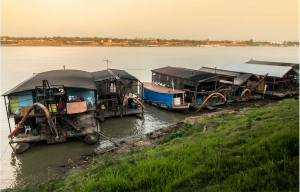
The dredgers spend the day parked on the margin of Madeira River opposed to Porto Velho, waiting for the panning process, which occurs at night.
On the bridge over Madeira River, it was possible to see large shadows slowly moving in the dark. They seemed ghost ships, which engines could be vaguely heard only. Some rare and small points of light were seen, as garlands of fishing vessels on that fresh-water sea.
What we were witnessing were clandestine barges withdrawing; gold mining dredgers returning from the center of the huge river to their rest places. The reason to the curfew? There were, in WhatsApp groups, messages that it was not a good day to work. Rumors of an inspection that would occur that night scared the gold diggers and their machines away.
A dredger is like an animal with two giant snouts that submerge with cranes in the depth of the river looking for sparks of the precious metal in the middle of sludge, sand, and stones.
An illegal activity, the gold mining in dredgers there occurs only during the night, even if during the day such floating machines are visible, parked on the ravines of Madeira River, right in front of the city of Porto Velho, capital of Rondônia.
Driven by the continuing demand for the precious metal, thousands of workers risk their lives in an unhealthy work being continuously the target of actions of crime fighting. So much risk is compensated by the high prices of gold. This time, it is at its highest level within a decade — US$ 1,700 an ounce, or US$ 54 a gram
Other than at night, still very early, in the first hours of the day, the floating mining may be observed in all its splendor. It is at this time when the workers of the dredgers, always followed by the operation owner, beat the carpets with sand to extract sparks of gold that after will be amalgamated with mercury. All of that on the river margins, where tons of contaminated sediments are discharged in a careless manner.
It seems that there is a tacit agreement that the gold diggers shall only deal with the Northern portion of the river. In the South, it is the Sustainable Development Reserve of Madeira River, an state conservation unit, where, in theory, only there, the mineral exploration would be forbidden.
The owners of the dredgers are proud to keep themselves outside the reserve area, as if it would free them from the unquestionable fact that they are illegally acting: the lack of a license. In Brazil, there is no mineral exploration without a prospective mining. None of those rafts has such authorization, and for such reason, at that night, the activity had to be aborted upon the mere possibility that agents of Navy, of Federal Police, or of environmental bodies could be acting in the area.
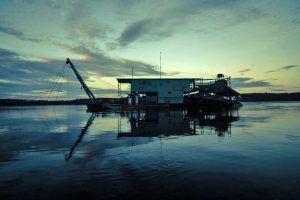
With their hoses that reach the bottom of the river, the dredgers spend the night looking for gold in the middle of sludge, sand, and stomes.
20 consecutive hours of work
In early October 2019, we could follow some work nights on board a dredger in Porto Velho.
The raft starts to work ata round 07:00 PM, when it turns on its two powerful dredging engines, with 165 HP (horse power) each. Then, the hoses start to suck the sludge from the bottom of the river and launch the muddy water in a kind of artificial cascade where thick carpets hold the heaviest sediments.
It is na unhealthy enviroment, agitated by the intense noise of the machines, which burn approximately 100 liters of diesel per night. Additionally, the angle of the large plastic pipes (with diameters from 30 cm to 60 cm) needs to be always adjusted. When one of then detaches from the cranes, one of the workers has to jump in the river, at night, and dive to set the ropes that keep it tied to the raft.
The work shifts are extremely exhaustive, and a large part occurs during the dawn. It is about 20 consecutive hours, from the time when the workers arrive to prepare the equipment until the following morning, when the dredgers turn off the engines, and the washing process of the carpets starts.
In the shift we followed, the total of obtained gold was 10 grams – approximately R$ 3,000.00 for those 20 hours of work. The commission given to the workers is only of 12%.
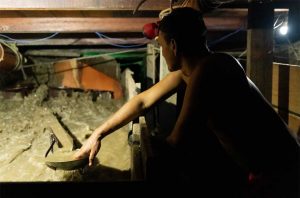
Sludge of the bottom of Madeira River reaches the dredger, starting the process of gold dredging.
Promissing market
Everything occurred in the first weeks of October. The economic scenario seemed very promissing to Júnior (fictitious name), the owner of the dredger. He is a young man, about 30 years old, who had worked as operator in the dredgers of an old gold miner in the boundary of Rondônia with Acre, at Ponta do Abunã. The old boss, upon seeing his dedication, made him an offer to buy the dredger. It was a great opportunity to Júnior, since the value of vessel was below the market price, even if he continues working to pay for it.
There, on Madeira River, navigating during the day, one will see a variety of dredgers – large, medium, and small. What established their value is not only the size, but the power of the engines, and the size of the pipes, something that will determine how much sediment is possible to suck from the bottom of the river.
Júnior tells us that the price of the dredgers varies from R$ 100 thousand to R$ 1 million. A piece of information of investigators of the Federal Public Prosecution Office identified investments that may achieve R$ 2 million in the mining activities of Madeira River
Who talks to the men and women that dedicate to such activity, soon notes that they defend it as an honest manner of working. The narrative is reinforced by the president Jair Bolsonaro, who has already expressly manifested the support to the gold miners, remembering that he himself was already involved in the activity in the past — his father extracted gold in Serra Pelada in the 1980’s.
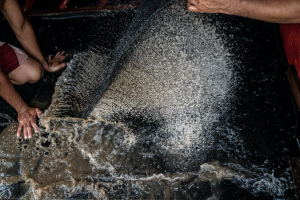
After working the whole night sucking the sludge from the bottom of the river, the workers of the dredgers have to beat the carpets to remove the sand and mud, and separate the gold.
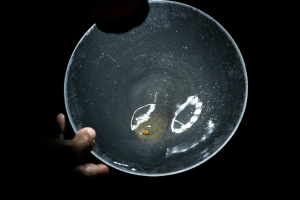
The sparkling process: on a panning tray, the gold deposits on the bottom with the fast and circular movements.
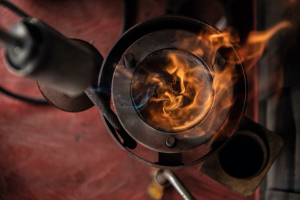
After working the whole night sucking the sludge from the bottom of the river, the workers of the dredgers have to beat the carpets to remove the sand and mud, and separate the gold.
New gold rush
A point all specialists agree upon is that any romantic image that once existed about the panning shall be broken. The rudimentary work of the man and his panning tray sparkling nuggets on the river bed does not exist anymore.
The sector increasingly has greater capacity of investment. “Mining has economic specificity”, pointed out the geologist and president of Brazilian Association of the Mineral Research Companies, Luiz Antônio Venassi. During a recent webinar promoted by Instituto Escolhas, he said that “the mining is increasingly more technical and with production capacity”.
According to a report recently published by Instituto Escolhas, there was an increase of 15% in the gold exports by the country in the first four months of 2020. There are no doubts that part of such gold was obtained in an illegal manner. With no mining prospection permit and with no environmental licensing, the miners could not, in theory, commercialize the gold before the DTVMs (acronym for the agents authorized to the purchase of gold), but use authorizations of other mines to justify the sale.
According to specialists, such pandemics time only uncovers a situation seen for a long time: a new gold rush in Amazon.
One of the hypotheses shared among many people is that the mining is na economic engne to a region already so affected as Amazon is. Whether for the good price, or the stability it represents, gold is an asset that stands out at the times of crisis. And guarantee of employment in scenarios of wide unemployment.
Bolsonaro government recognizes the illegality of the gold commerce in Brazil, but supports that it is difficult to fight it, especially in the most remote areas of Amazon. According to Frederico Bedran, Geology director of Ministry of Mines and Energy, “the mining is not a matter of police, it is a social matter. Isolated policies, whether environmental or mineral, will not resolve.”
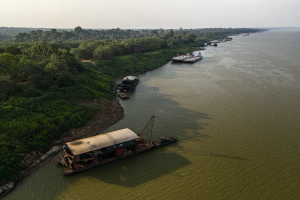
A mining dredger on Madeira River may cost from R$ 100 thousand to R$ 1 million. Although the investment is high, the increase in gold quotation has provided opportunities of richness in the pandemics of Covid-19.
Banner image: nugget is weighted at the end of 20 hours of work.
Click here and access the article at Mongabay site
Click here and access the Discussion Text “The new gold rush in Amazon”
Related
Brazil attended COP-6 in Minamata without presenting an action plan to address mercury usage in mining
Study shows 2,274% increase in herbicide use for soybean production
Technical assistance is prevalent in legal regulations and public policies; however, a study indicates that it does not adequately reach rural producers
Study reveals Brazil applies pesticides and fertilizers inefficiently and unsustainably in soybean farming

 Texto
Texto